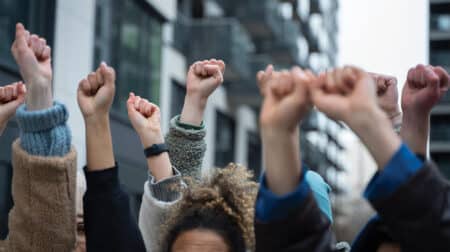WASHINGTON — US President Donald Trump said on Monday he could return to Jerusalem in May when the US opens its new embassy in the city to coincide with Israel’s 70th anniversary.
Sitting across from Prime Minister Benjamin Netanyahu in the Oval Office, the American president was asked if he would travel to Israel to cut the ribbon on the new facility, almost a year after his first visit to Jerusalem as president.
“I may. I may,” he said. “We’re looking at coming, if I can, I will.”
He went on, “We’re going to have it built very quickly and very inexpensively. They put an order in front of my desk last week for a billion dollars. I said, ‘A billion? What’s that for?…We’re not going to spend a billion dollars. We’re actually doing it for about $250,000. So check that out. Now it’s temporary, but it will be very nice.”
Trump in December bucked decades of US foreign policy by formally recognizing Jerusalem as Israel’s capital and setting in motion plans to move the US embassy there from Tel Aviv. Earlier this month, the US said the move would take place to coincide with Israel’s 70th birthday.
Asked when he would unveil his secretive plan for Israel-Palestinian peace, Trump would not disclose a date, but said his administration was preparing for its release.
“We’re going to see. We’re working on it very hard. I think we have a very good chance,” he said. “The Palestinians, I think, are wanting to come back to the table. If they don’t, you won’t have peace.”
“This is the first time we meet in Washington, America’s capital, after you declared, Mr. President, that Jerusalem as Israel’s capital,” he said. “And this was a historic proclamation, followed by your bold decision to move the embassy by our upcoming national Independence Day.
“The Jewish people have a long memory,” Netanyahu went on, citing the Persian King Cyrus the Great, who 2,500 years ago allowed Jewish exiles in Babylon to return to Jerusalem and rebuild the Temple; Lord Arthur Balfour, a British foreign secretary who 100 years ago recognized the Jewish people’s right to a homeland in Mandatory Palestine; and Harry Truman, the first US president to recognize the State of Israel.
“And we remember how, a few weeks ago, President Donald J. Trump, recognized Jerusalem as Israel’s capital,” Netanyahu said. “Mr. President, this will be remembered by our people throughout the ages. Others talked about it, you did it.”
The prime minister said he was looking forward to discussing other regional issues with the president.
“If I had to say what is the greatest challenges to both our countries, to our Arab neighbors, it is encapsulated in one word: Iran,” he said. “Iran has not given up its nuclear ambitions. It came out of this nuclear deal emboldened, enriched. It’s practicing aggression everywhere, including on our own borders.
“We have to stop this country that chants, ‘Death to Israel, Death to America.’ Iran has to be stopped. That is our common challenge,” Netanyahu said.
Because of Iran, he said, it was also important to “exploit the opportunities for peace” with the Palestinians.
“Because the Arabs have never been closer to Israel,” he said, “Israel has never been closer to the Arabs. And we seek also to broaden that peace to the Palestinians.”
The White House meeting, held during Netanyahu’s visit to the annual conference of the influential lobby group the American Israel Public Affairs Committee (AIPAC), is expected to provide a boost for him as scandals and political turmoil brew at home.
The prime minister’s domestic problems mounted even as he prepared to meet Trump, when Israeli media reported that a former spokesman for his family, Nir Hefetz, had become the third Netanyahu associate to sign a state witness deal with prosecutors in recent months.
AFP contributed to this report.
Originally posted at The Times of Israel.




